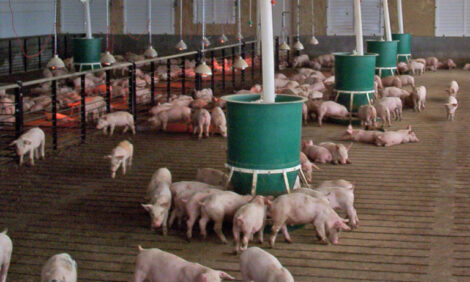



Dietary Enzyme Improves Nutrient Digestibility of Canola Meal Diets
By Ruurd T. Zijlstra, John F. Patience, Praire Swine Centre and P. Howard Simmins, Finnfeeds International Ltd., Marlborough, UK, - A trial was conducted with cannulated weaned pigs to study effects of a dietary enzyme on nutrient digestibility. Supplemental enzymes that degrade some of the NSP were useful in improving ileal digestibility of energy and amino acids, but not total tract digestibility of energy.
Introduction
The nutritional value of canola meal and cereal grains is limited by fiber, also named non-starch polysaccharides (NSP). The objective was to evaluate effects of supplementation of a wheat or barley-canola meal diet with NSP-degrading enzymes (b-glucanase and xylanase) on digestibility of energy and amino acids.
Experimental Procedures
Cannulated weaned pigs were fed 25%-canola meal diets with either barley or wheat as the main cereal, with or without a dietary enzyme mix. Diets were formulated to 3150 kcal DE and 10.6 g digestible lysine, and were thus limiting in energy but not amino acids.
Results and Discussion
Dietary enzyme improved ileal digestibility of energy from 63 to 70% in the barley- and from 68 to 73% in the wheat-canola meal diet (P < 0.05), resulting in a marked improvement in the amount of DE digested by the end of the small intestine (Figure 1). An enzyme effect could not be detected on total tract energy digestibility (P > 0.10), and the resulting dietary DE content was similar among diets (Figure 2). Although the diets were formulated to 3150 kcal DE/kg diet, the measured DE content at 90% DM was 2870 for the barley- and 2920 for the wheat-canola meal diet. Dietary enzyme did not affect amino acid digestibility for the barley diet (81%), but improved apparent lysine digestibility from 81 to 84% for the wheat-canola meal diet (P < 0.05).
Implications
Together these results indicate that using supplemental enzymes with a barley- or wheat canola meal diet can increase the amount of energy available to support protein deposition. One strategy to maximize the benefits of supplemental enzymes can be to formulate diets to be limiting in energy (and thus reduced cost) and estimate the improvement in available energy to reach a target for energy required to support protein deposition.
Acknowledgements
Strategic funding was provided by SaskPork, Alberta Pork, Manitoba Pork and Saskatchewan Agriculture and Development Fund. Project funding was provided by Canola Council of Canada, Finnfeeds International, Saskatchewan Canola Development Commission, and the Program for Export Market Development.


Source: Prairie Swine Centre - September 2004








